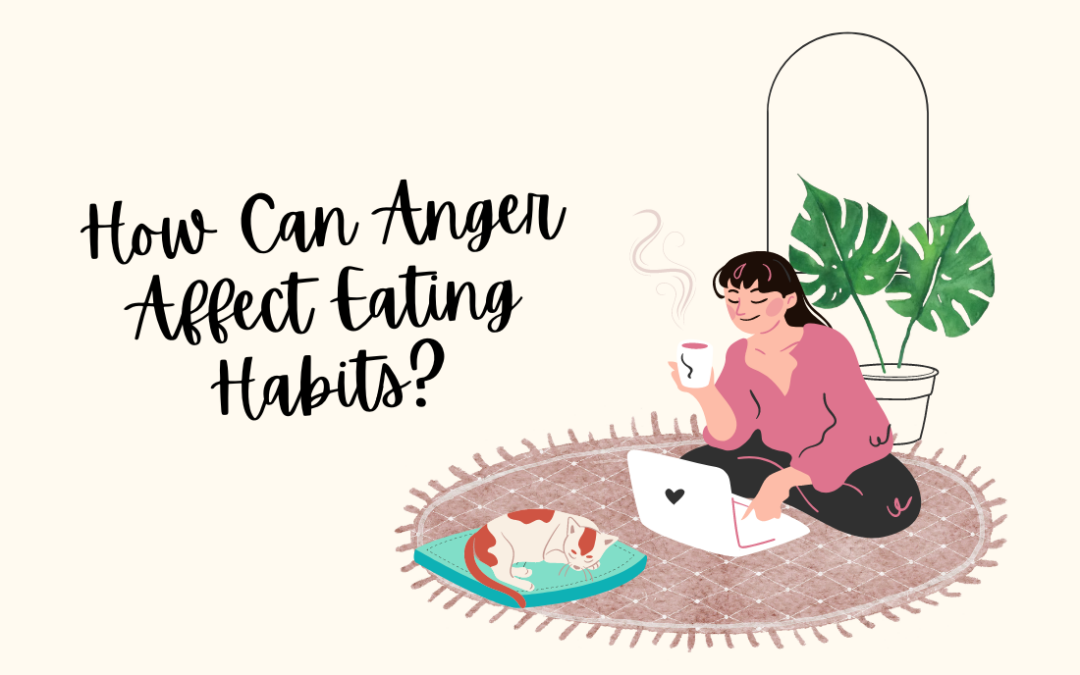Does Anger Affect My Eating Habits!?
If you’ve ever found yourself reaching for snacks or overeating when you’re upset, you’re not alone.
But how can anger affect eating habits?
Anger is a powerful emotion that can disrupt your eating patterns, driving you to crave comfort foods or engage in stress eating. In this post, I’ll explore exactly how anger impacts your eating habits, why it happens, and what you can do to feel like yourself again.
Written by Jenn Hand, Holistic Nutritionist, Board Certified Health Coach, NBC-HWC
How Anger Has Affected My Eating Habits
Anger has always been a challenging emotion for me.
When I first started working on my emotions, I never felt angry–it manifested as other feelings. I always turned the anger back to myself in blame and shame. But as I began healing my relationship to food and working to feel emotions instead of eat over them, I DID begin to feel angry.
And then the floodgates opened
I remember years ago I found out that one of my close friends from home didn’t tell me she’d had her baby.
I had heard it from someone else–who had found out on Facebook.
I was VERY angry.
How could she forget to text me? How could she post it on social media before even thinking to let me know? How could she not remember to put me on the group text of our friend group?
I remember feeling hot, fiery and livid.
And I REALLY wanted to go to the grocery store to get a big bakery muffin.
Since I was an avid journal-er, I decided to take to my journal before I went to the store to deal with some of my feelings. When I began dumping that craziness in my mind onto paper, I realized something major.
The anger was masking deep hurt. I was hurt because I felt forgotten.
I felt a sense of sadness that I wasn’t important to her. I felt a heaviness in my heart that I wasn’t a thought to be included amongst our other friends.
But as I worked through it–releasing tears and comforting myself with my writing–I moved through the emotions.
Table of Contents
- How Anger Can Be Connected to Food Choices
- What Is Emotional Eating?
- Understanding the Difference Between Physical Hunger and Emotional Hunger
- The Science Behind Anger and Appetite Changes
- The Role of Cortisol and Other Stress Hormones in Emotional Eating
- The Impact of Emotional Eating on Health
- Recognizing the Triggers That Lead to Anger-Induced Eating
- How to Manage Anger to Protect Your Health
- Tips for Building a Long-Term Plan to Manage Anger
- 10 Things To Do Instead of Eating
- The Role of Mindful Eating in Managing Emotions
- Common Questions
How Anger Can Be Connected to Food Choices
Anger is a powerful emotion, and it often leads us to seek comfort, relief, or distraction in food as a way to cope.
When you’re feeling angry (and don’t know what to do with it,) it’s easy to reach for foods that provide immediate gratification, like sweets or salty snacks, to help manage the anger.
Most of us don’t grow up learning how to deal with emotions, especially anger, and food becomes a tool for dealing with the feeling. It can be part of a larger pattern of turning to food to cope with challenging emotions.
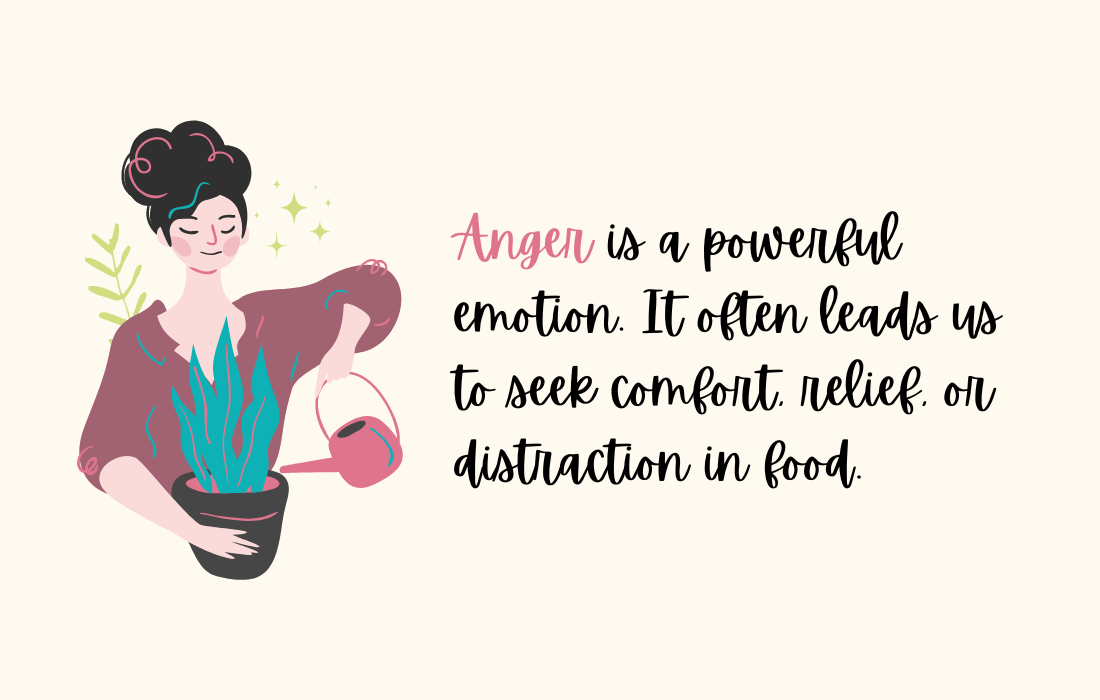
What Is Emotional Eating?
Emotional eating happens when we turn to food as a way to soothe or distract ourselves from uncomfortable emotions.
When life throws us a curveball–stress, overwhelm, grief, fear, anxiety or any other hard emotion, we may turn to food to escape or numb the intensity of what we’re feeling.
It’s important to recognize that food can’t solve the underlying issues behind our emotions, but it’s often used as a temporary band-aid for dealing with emotional pain.
Understanding the Difference Between Physical Hunger and Emotional Hunger
Physical hunger is a sensation in the body and usually comes on gradually– it’s our body’s natural signal that it needs fuel.
Emotional hunger, on the other hand, often feels sudden and urgent, especially when we’re angry or upset. Recognizing the difference between the two is crucial—physical hunger can be satisfied with food, while emotional hunger usually craves specific comfort foods and is tied to emotional states rather than a true need for nourishment.
The Science Behind Anger and Appetite Changes
When we get angry, our body experiences both biological and psychological shifts.
Anger can trigger the fight-or-flight response, which either suppresses your appetite or increases cravings for high-calorie, comforting foods. This happens because the body is trying to either prepare for action or soothe itself from the emotional turmoil.
I know for me, when I get angry I typically am not hungry at all–my body is in fight or flight–but once I sort of ‘come down’ a bit from the feeling, I’ve had periods where I would eat over not knowing what to do with the residual feeling of anger.
The Role of Cortisol and Other Stress Hormones in Emotional Eating
Cortisol, the stress hormone, is released in higher amounts when you’re angry or stressed, and this can increase cravings for sugary and fatty foods.
Your body craves quick energy during times of emotional stress, and these foods provide fast fuel. The quickest to digest foods are simple carbs and sugar–typically ones we crave when we emotionally eat.
The Impact of Emotional Eating on Health
Over time, emotional eating can impact our lives in a big way.
I used to deal with any emotion with food–sad, anxious, afraid, uncertain–whatever I felt and used food to soothe, comfort or distract me.
Mentally, emotional eating can leave us feeling guilt or shame, trapping us in a cycle of using food to cope without addressing the root of your anger, feeling bored, trapped in overwhelm, or other hard emotional state.
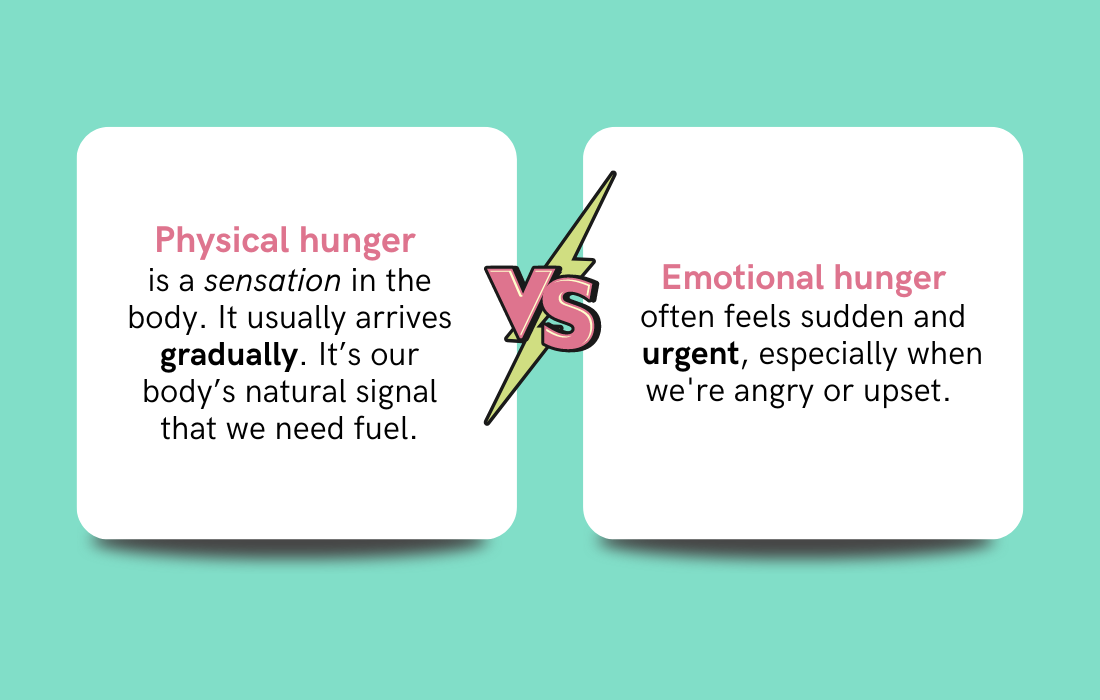
Recognizing the Triggers That Lead to Anger-Induced Eating
Learning to recognize what sets off your anger-induced eating is key to breaking the habit.
Maybe it’s stress from work, conflict in relationships, or even internal frustration with yourself. Anger is typically an umbrella emotion for something that you’re feeling underneath. For example, maybe you get really angry at your partner for not helping around the house.
You get riled up, stewing in anger and resentment that you have to “do it all.”
Underneath, typically, there are other emotions–feeling unappreciated, feeling alone, fear of creating boundaries, etc. Once you identify these triggers, you can journal, explore and dig deeper into ways to respond to the anger and/or address any other underlying emotions instead of turning to food for comfort.
Grab your journal to delve into what triggers you!
What makes you feel hot and fiery inside? Who pushes your anger button? What situations enrage you? Learning what sends us into the emotions is the first step to change!
How to Manage Anger to Protect Your Health
Managing anger effectively can protect both your emotional, physical, and mental health.
Techniques like deep breathing, journaling, or even taking a few minutes to step away and calm down can help ground and balance you when you’re feeling angry.
Journaling was a big help for me when I got angry. I never knew how to handle anger and would feel powerless, so writing down my swirling thought help to ground me and sift through some of the mess that was in my head.
Sometimes just naming the emotion and understanding that we DO feel angry can help release some of the intensity.
Healing anger is about finding tools that help you process your anger in a healthy way, rather than bottling it up and using food to cope.
Tips for Building a Long-Term Plan to Manage Anger and Create a Healthier Relationship with Food
Building a sustainable plan to manage anger in your daily life and improve your relationship with food starts with self-awareness.
Start by tracking your emotional triggers and noting when anger leads you into the food. This can help you identify patterns and prepare for moments of high stress. Incorporating stress-relief techniques like journaling, meditation, or deep breathing exercises can be great to try when you feel the beginning of the intense emotion.
Practicing self-compassion is key—acknowledge that emotions like anger are natural, and being human is part of the process.
Surround yourself with support, whether that’s a coach, a community, or a friend who can help you stay accountable. Creating a plan can also mean incorporating more nourishing coping mechanisms–physical activities, talking through your emotions, or exploring creative outlets.
Over time, as you learn to address your emotions head-on, food will no longer be your go-to for managing stress or anger.
10 Things To Do Instead of Eating:
1. Get out your journal.
When you’re feeling all jumbled in your mind, journaling forces you to slow down and sort out what’s going on. Because when you want to eat, there’s often much more going on than just being hungry.
2. Turn on your favorite hilarious TV show.
Sometimes laughter is just what we need to snap us out of wanting to eat everything in the pantry.
There’s nothing like big belly laughs to make you forget that you wanted to have a date with the Dorito bag on the couch. (PS-if you have Netflix, watch Aziz Ansari’s stand up. It. Is. HILARIOUS)
3. Take a walk.
Whenever I’ve had dinner, and still feel that “I kinda want something sweet” urge start to hit, I try to get out and go for a walk.
There’s something about getting out of your house and into the world that snaps us out of our “I want food. Now.” thought patterns.
4. Do something mindless.
For many people knitting is calming (I took a knitting class with my mom a few years ago. Epic fail).
For others, jigsaw puzzles, Sudoku, or other word games are soothing. Find something meditative, mindless, and calming and do it!
5. Get lost in your favorite book.
When I’m in the middle of an addictive book, I turn into this anti-social hermit who doesn’t talk to anyone until the book is finished.
So, maybe choose a semi-addicting book that still allows you to engage in the world? Getting lost in a book is a great way to “escape” reality for a bit 🙂
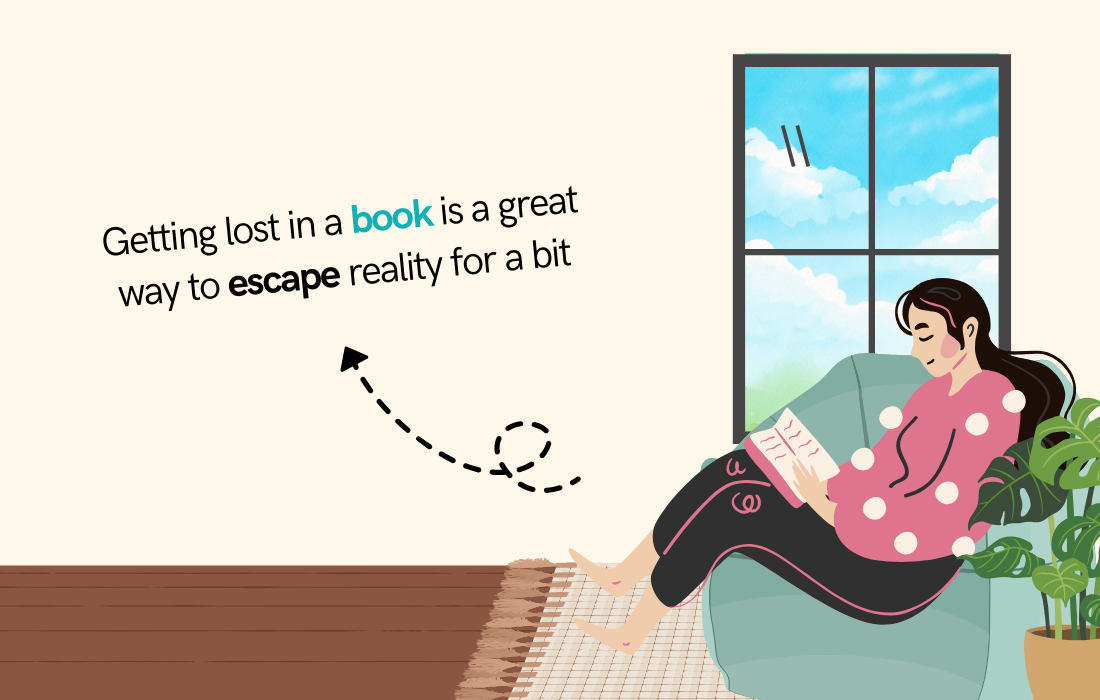
6. Yoga, yoga, and more yoga.
If someone asked me what has been the biggest catalyst for change in my life, I would say yoga.
This is an amazing tool to get you OUT of your head and INTO your body. Which is what a lot of crazy-all-over-the-place eating is: spending a shit ton of time in our heads and not in our bodies. Try a yoga class and see how those deep yoga breaths can transform your life!
7. Put on your fave music and belt it out sista!
I can’t think of a better way to elevate your mood then to blast your favorite song and sing your heart out.
If you can’t do it in your house, then go take a drive and do it! My best choices: Disney tunes, the Rent soundtrack, some good ole Whitney Houston ballads, Kelly Clarkson slow jams, Dixie Chicks “Not Ready to Make Nice” (This one you can seriously get in to).
Bonus: blast it loud enough so you’re feeling like “man, I sound really good and totally could try out for American Idol” 🙂
8. Clean.
Are you groaning at this suggestion? Don’t roll your eyes just yet.
Cleaning out your garage or closet or underneath your bed (or anything else in your living space) is a great way to distract yourself from wanting to eat. Plus, you’ll end up being productive and crossing off some things on your to-do list!
9. Facetime/Skype/Call a friend.
Is there someone you’ve been meaning to catch up with? A friend or family member you haven’t talked to in a while? I’m sure they’d love to hear from you.
We get so busy in our lives that it’s hard to find time to catch up with old friends. Now is a perfect time. You could even call a grandparent! (I sound like my mom now, nagging me to call my grandparents every month 🙂 )
10. Go to a store or somewhere where there are people around.
This one definitely works like magic in diminishing the desire to eat.
Being out and about in the business of the world gets you out of yourself. It forces you to focus on what’s going on around you and on all the other things there are in the world besides housing the box of Wheat Things.
Next time you feel that “hmmm I wanna eat some Oreos or cupcakes or chocolate or…” (and being that you aren’t physically hungry), use one of these suggestions on the list!
Because, sometimes, you just need a quick distraction to stop thinking about food.
The Role of Mindful Eating in Managing Emotions
Mindful eating can be a powerful tool in managing emotions like anger.
By slowing down and paying attention to your food choices, you become more aware of whether you’re eating out of hunger or emotion. Practicing mindful eating helps create a healthier connection with food and allows you to pause and reflect on what your body really needs in the moment.
While it’s not realistic to eat mindfully every single time we eat (we’re human after all and busy!) but nudging yourself to slow down, take a few breaths, savor your food, and eat without distractions can be helpful to develop more peaceful eating habits.
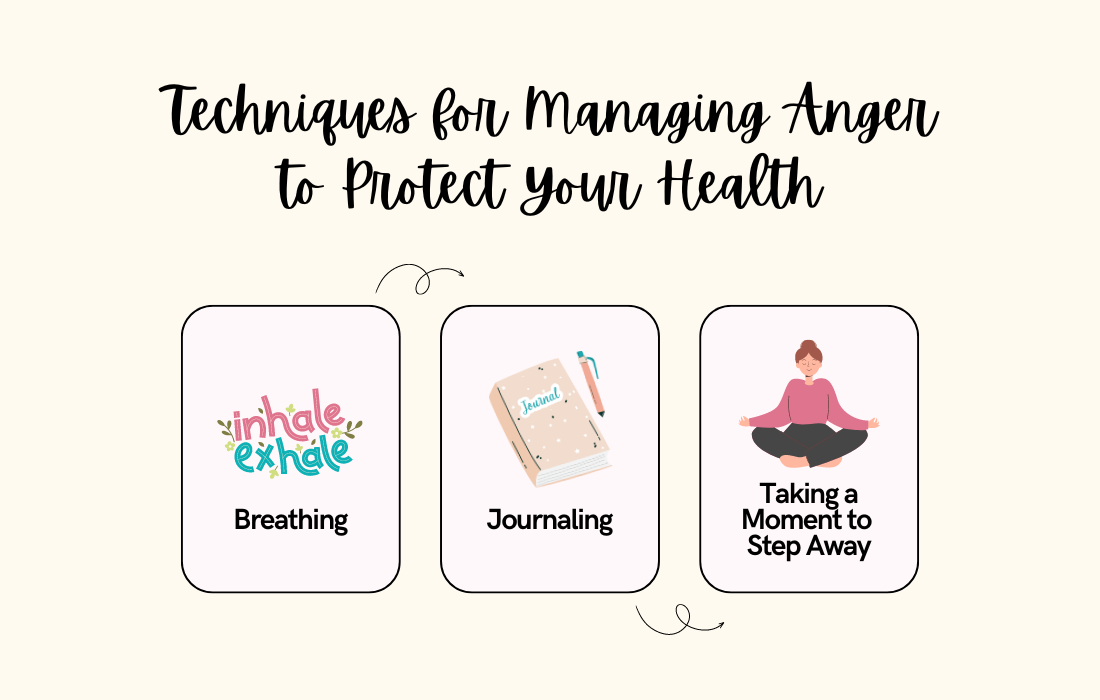
Common Questions
How can I make healthy food choices when I’m upset or angry?
When you’re upset or angry, try to pause and check in with your emotions before eating.
Taking deep breaths or seeing what’s underneath the feeling can help you make healthier choices in the moment.
Does anger affect appetite?
Yes, anger can either suppress your appetite or increase cravings for comfort foods, depending on how your body and mind respond to stress.
Can anger lead to poor food choices?
Negative emotions like anger, frustration, sadness, etc can cause us to reach for quick, comforting foods that may “soothe” us in the moment.
Anger is a challenging emotion to deal with so if we don’t know how to process it, we may turn to food.
Can anger trigger binge eating episodes?
Anger can act as a trigger for binge eating for many people leading to overeating as a way to numb or distract from uncomfortable emotions.
Can emotions like anger contribute to the development of eating disorders?
Prolonged or constant anger can contribute to disordered eating patterns over time, especially if food becomes a way to cope with or manage difficult feelings.
Is emotional eating considered an eating disorder?
Emotional eating isn’t classified as an eating disorder, but when it becomes habitual or significantly impacts your life, it can be part of a broader issue (like bingeing, etc)
What healthy snacks can help manage cravings when feeling angry?
Snacks like nuts, fruit, yogurt, or veggie sticks with hummus can offer both comfort and nutrition when you’re dealing with emotional cravings.
I like a “crunch” when I feel angry, so you could experiment with crunchy foods like chocolate rice cakes with peanut butter, roasted chickpeas or trail mix.
How do anger issues affect weight management and long-term health goals?
Chronic anger can disrupt your ability to stick to healthy eating habits and make it harder to reach long-term weight management goals, especially if it leads to frequent emotional eating.
How can anger affect your food choice and lead to poor decisions?
Anger can cloud your judgment, causing impulsive food decisions that are more about immediate comfort than long-term health.
What techniques can help reduce appetite when dealing with anger?
Instead of thinking of “reducing appetite,” it can be helpful to look at it from a lense of working through what’s really bothering you to process the feeling.
Deep breathing, journaling or meditation can help you get in touch with what’s underneath the anger so you don’t turn to food to cope.
What is “dietary restraint?” Is it a reasonable goal?
Dietary restraint isn’t a term I typically use, as it feels very “willpower-y.” We want to rely on an approach that includes emotional awareness as a more sustainable goal.
Related Articles
⚪ What Is Emotional Eating?
⚪ How To Stop Emotional Eating at Work
⚪ How To Stop Boredom and Emotional Eating
Get the Normal Eater’s Newsletter
Join 8000+ women who are overcoming overeating, binge eating, and breaking up with dieting forever. Get Jenn’s inspiring and actionable weekly newsletter with the latest posts, podcasts, and tips on how to love your body, find food freedom, and lose weight holistically.
Get the Normal Eater’s NewsletterWork with an Emotional Eating & Holistic Nutrition Coach
Overcome Bingeing and Emotional Eating, and Break Up with Yo-yo Dieting
Working with an emotional eating coach and holistic nutritionist can help you get free from the frustrating binge and restrict cycle and stop yo-yo dieting.
You don’t have to be obsessed with food or have a million rules around eating to find your natural weight and learn to love your body. Ready to actually see a lasting change and experience true freedom?
Schedule a 20-min CallAbout the Author:

Jenn Hand has been helping women like you become normal eaters since 2015.
She’s worked with thousands of women, helping them to balance their bodies, end bingeing, stop obsessing over food, and start feeling amazing again. As a board-certified health coach and holistic nutritionist, Jenn knows how to support you in making real positive changes that last.
Her articles have been published on Mind Body Green, Tiny Buddha, Thrive Global and other local and global media platforms. She’s the author of How to Be a Normal Eater and the creator of The Normal Eater’s Club program. Listen to Jenn’s advice and tips on the Cake Doesn’t Count Podcast, or read more of her articles for free on the Food Freedom Blog.
Learn About Coaching!
